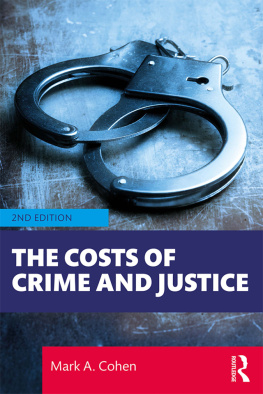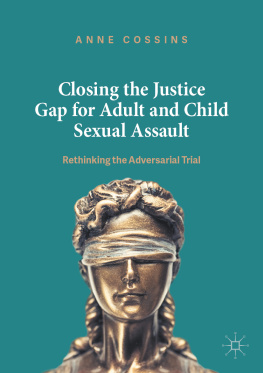Victims and Policy-Making
Victims and Policy-Making
A comparative perspective
Matthew Hall
Published by
Willan Publishing
2 Park Square
Milton Park
Abingdon
Oxon
OX14 4RN
Published simultaneously in the USA and Canada by
Willan Publishing
270 Madison Avenue
New York
NY 10016
Matthew Hall 2010
The rights of Matthew Hall to be identified as the author of this book have been asserted by him in accordance with the Copyright, Designs and Patents Act of 1988.
All rights reserved; no part of this publication may be reproduced, stored in a retrieval system, or transmitted in any form or by any means, electronic, mechanical, photocopying, recording or otherwise without the prior written permission of the Publishers or a licence permitting copying in the UK issued by the Copyright Licensing Agency Ltd, Saffron House, 610 Kirby Street, London EC1N 8TS.
First published 2010
ISBN 978-1-84392-824-9 paperback
978-1-84392-825-6 hardback
British Library Cataloguing in Publication Data
A catalogue record for this book is available from the British Library
Project managed by Deer Park Productions, Tavistock, Devon
Printed and bound by T.J. International, Padstow, Cornwall
For Claire and Edward
List of abbreviations
| AdVIC | Advocates for Victims of Homicide (Ireland) CEDAW Convention on the Elimination of Discrimination against Women |
| CICA | UK Criminal Injuries Compensation Authority |
| CIViTAS | Institute for the Study of Civil Society (UK) |
| CPS | UK Crown Prosecution Service |
| CRC | Convention on the Rights of the Child |
| DoJCD | Department of Justice and Constitutional Development (South Africa) ECtHR European Court of Human Rights EG-TFV Task Force to Combat Violence against Women, including Domestic Violence |
| HEUNI | European Institute for Crime Prevention and Control |
| ICC | International Criminal Court |
| ICCPR | International Covenant on Civil and Political Rights |
| ICVS | International Crime Victimization Survey |
| IHRIHL | Basic Principles and Guidelines on the Rights to a Remedy and Reparation for Victims of Gross Violations of International Human Rights Law and Serious Violations of International Humanitarian Law |
| IOVA | International Organization for Victim Assistance |
| NAVSS | National Association of Victim Support Schemes (UK) NICRO National Institute for Crime Prevention and the Reintegration of Services (South Africa) |
| NJC | Neighbourhood Justice Centre (Victoria, Australia) |
| NOVA | National Organization of Victim Assistance (US) |
| NVCAP | National Victims Constitutional Amendment Passage (US) |
| NZCVSG | New Zealand Council of Victim Support Groups |
| OSCE | Organization for Security and Co-operation in Europe |
| PFI | Private Finance Initiative |
| POMC | Parents of Murdered Children |
| PSA | Public Service Agreement |
| SAMM | Support After Murder and Manslaughter |
| TIP | Trafficking in Persons Report (US Department of State) |
| TRC | Truth and Reconciliation Commission (South Africa) |
| VIS | Victim Impact Statements |
| VSO | Victim Support Organisation |
| WAVES | Witness and Victim Experience Survey |
| YOT | Youth Offending Team (UK) |
Acknowledgements
My thanks go to all the policy makers, civil servants, and victim support staff and volunteers who contributed their time and expertise to this project. Particular thanks go to staff at the US Victims of Crime Office, the South African Department of Justice and Constitutional Development, and to Victim Support Europe for the copious amount of information they were willing to share. I am also particularly indebted to all the respondents from the Australian Ministries of Justice, and from Victim Support Australasia and New Zealand, for being so helpful in the arrangement of mutually convenient telephone interviews and discussions.
I would also like to thank colleagues from the University of Sheffield Centre for Criminological Research, and from the University of Sheffields School of Law, for innumerable discussions, consultations and brainstorming sessions on every aspect of this project.
Finally, I would like to thank my wife Claire and my son Edward, whose support and love is reflected on every page of this volume.
Any errors or omissions remain my own.
Chapter 1
Victims on the world stage
Introduction
The nature and extent of victimization is not adequately understood across the world. Millions of people throughout the world suffer harm as a result of crime, the abuse of power, terrorism and other stark misfortunes. Their rights and needs as victims of this harm have not been adequately recognized.
(World Society of Victimology 2006: n.p.)
In this extract from its Strategic Plan, the World Society of Victimology gives voice to a concern being expressed in jurisdictions across the globe for the lack of support, services and rights afforded to many victims of crime and other misfortunes. As a response to such challenges, victims of crime have become a topic of great political interest and policy movement, for both individual jurisdictions and international organizations. Such developments become particularly significant in light of the victims near indivisibility in criminal justice in past decades whereby, as states assumed responsibility for reacting to crime and pursuing prosecutions, the role of the crime victim in this process became further and further eroded in most jurisdictions (Spalek 2006). The apparent reversal of this trend, witnessed in many countries across all continents in recent years, raises fundamental questions concerning the common influences on policy making between states, the politicization of crime victims and the changing relationship between the state and the individual.
Brazilian literature on criminal victimization is also fast developing (Paes-Machado and Nascimento 2006).
In Europe, where the UK and The Netherlands have traditionally driven much of the academic and policy discussion on crime victims, the 2001 EU Council Framework Decision on the Standing of Victims in Criminal Proceedings representing around 21 countries. In Australia and New Zealand, restorative justice initiatives have highlighted victim issues, as well as posing fundamental questions concerning the adequacy of the adversarial system in meeting their needs (Dignan 2005). In Asia, the Japanese Basic Act on Crime Victims came into force in 2004 with the goal, as indicated in its preamble, of promot[ing] the measures for Crime Victims comprehensively and systematically. More recently, the Supreme Court of China has called for the creation of a state compensation scheme for victims of violent crime (Peoples Daily 2007). Jurisdictions comprising the region of North Africa and the Middle East have been exchanging best practice in supporting child victims of violence since 2005 (National Council for Childhood and Motherhood 2005) while South Africa has recently introduced its own Victims Charter to afford rights to victims in the criminal process, with a significant focus on restorative justice options (South African Department of Justice and Constitutional Development 2009).






